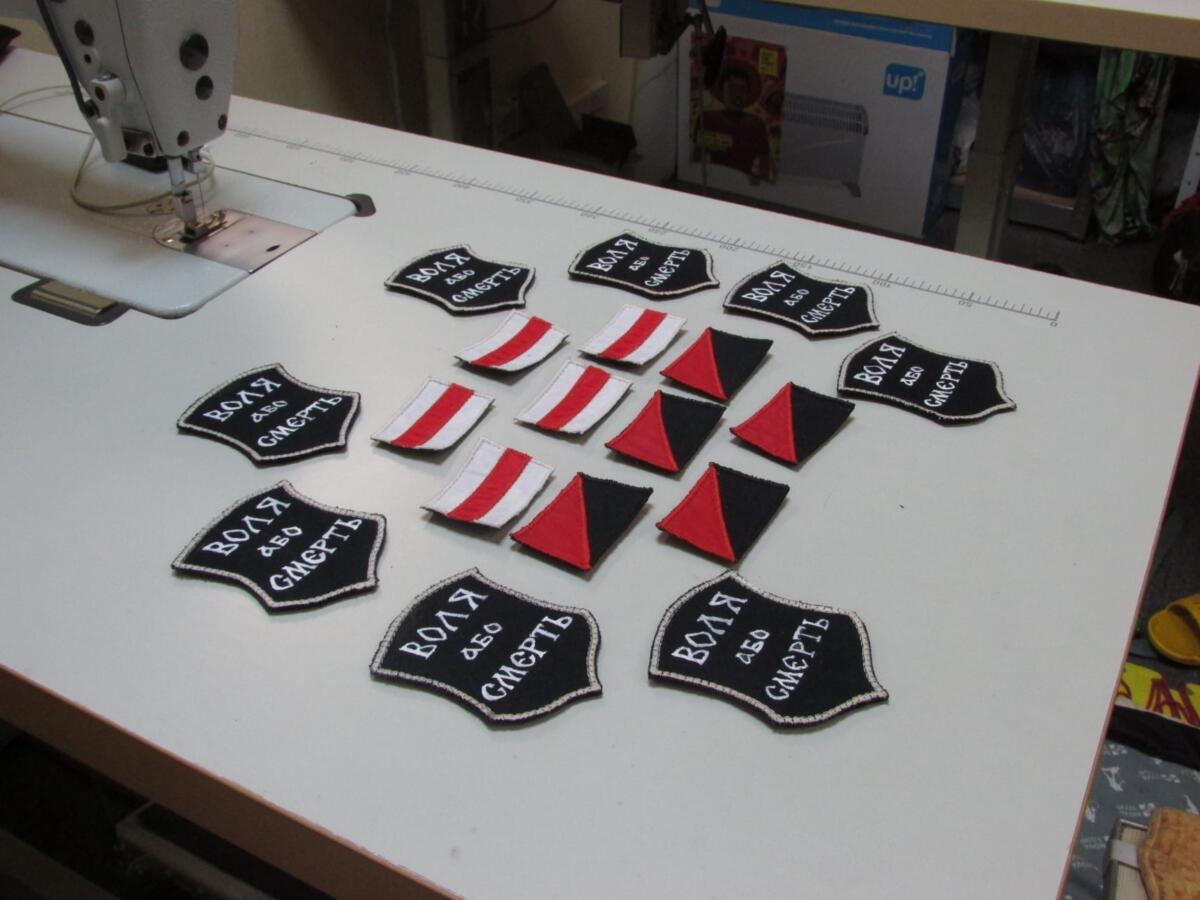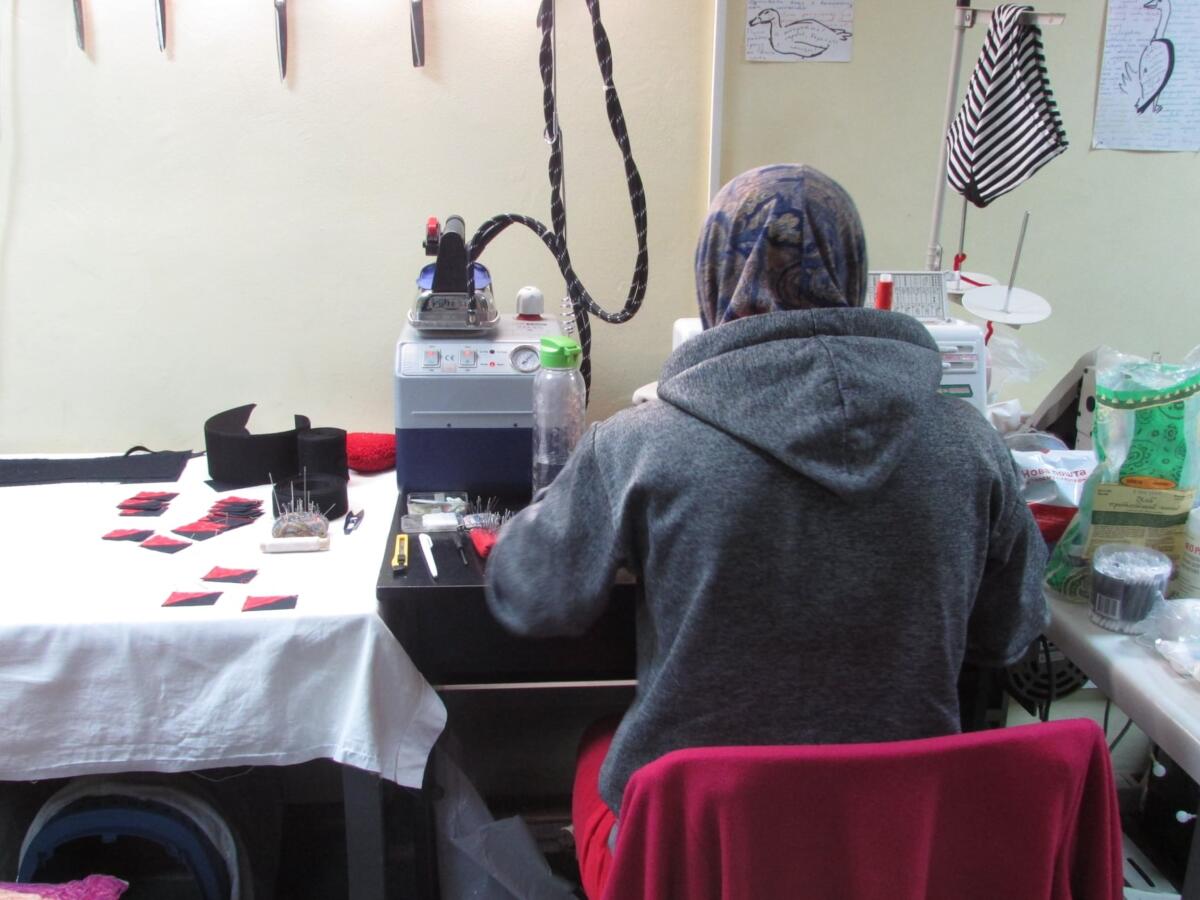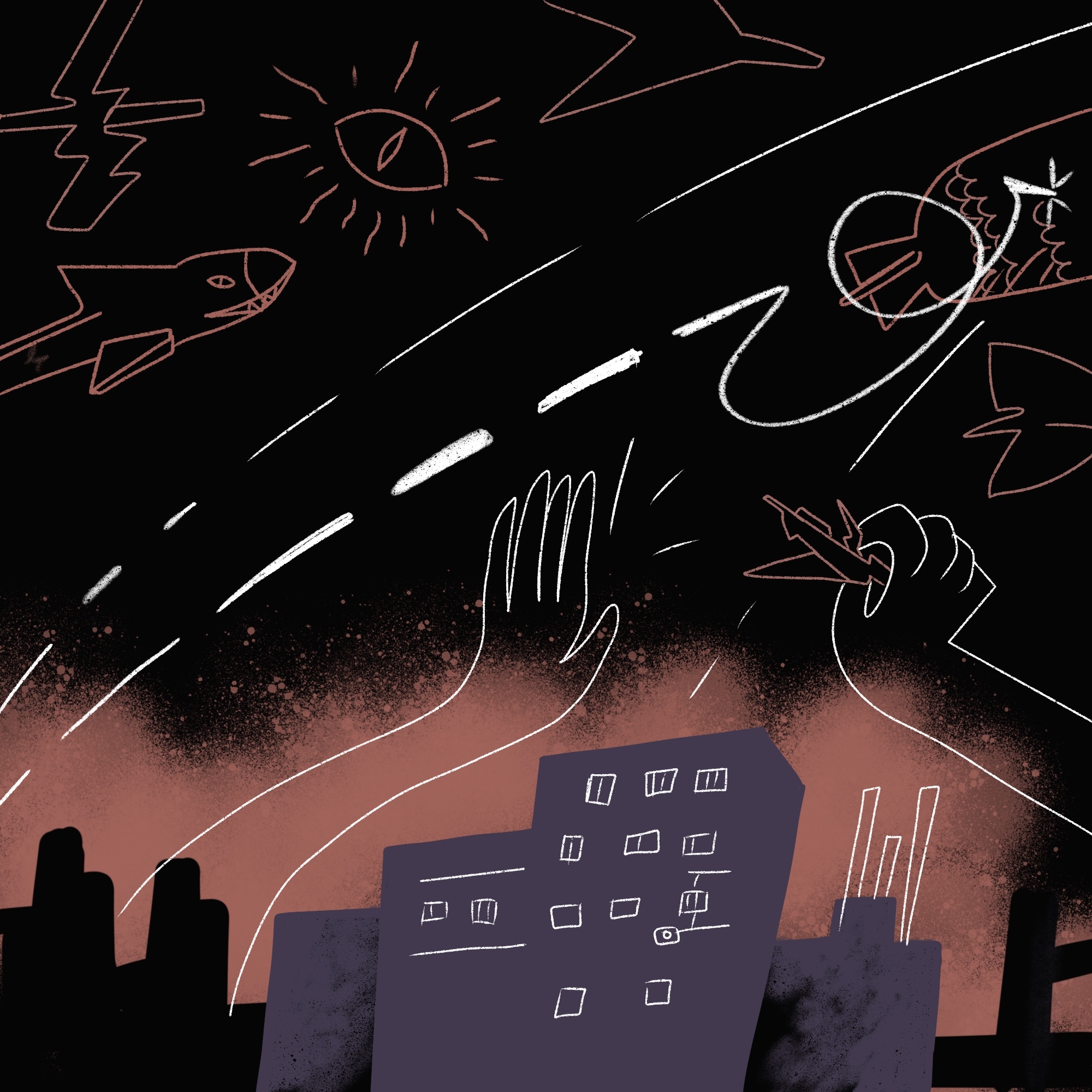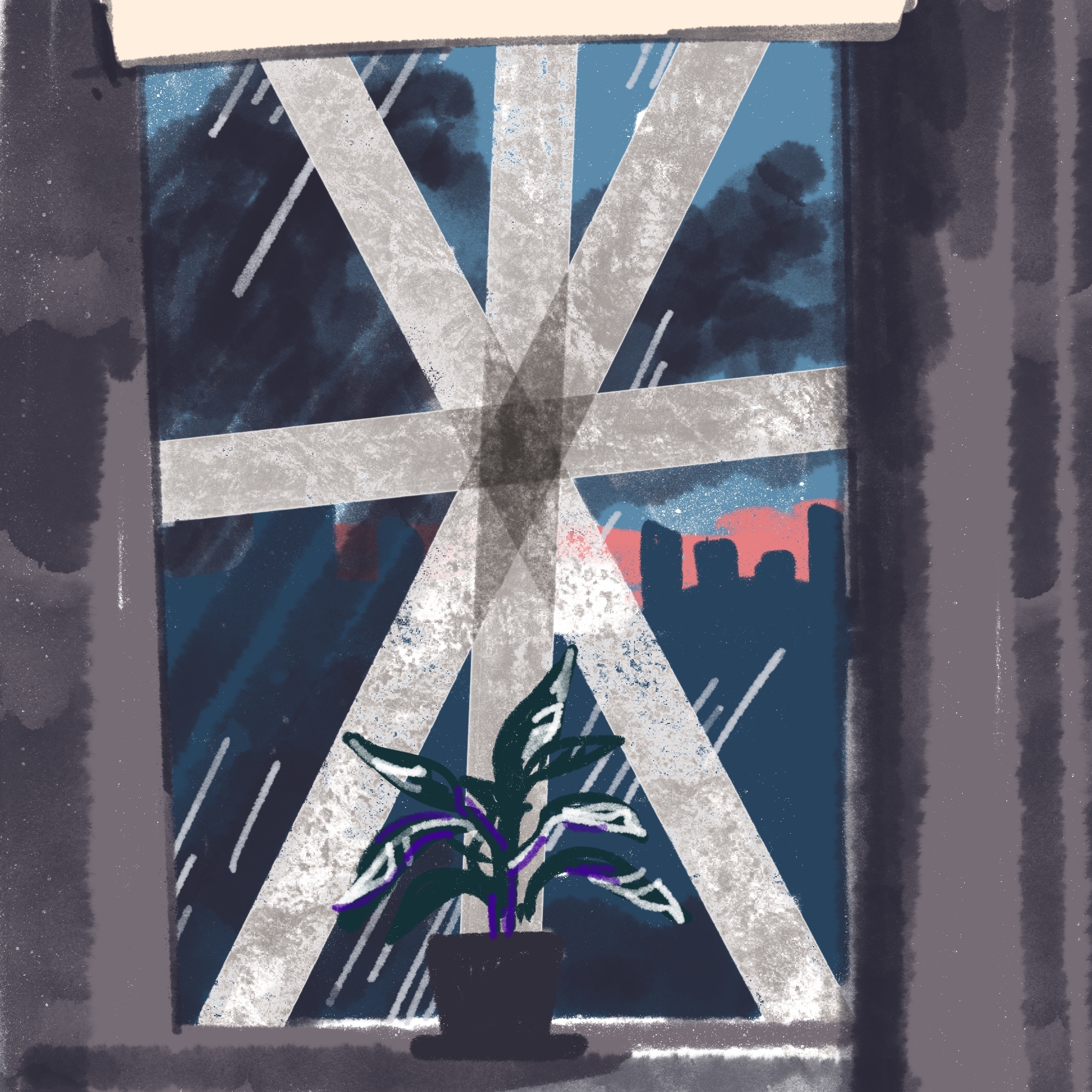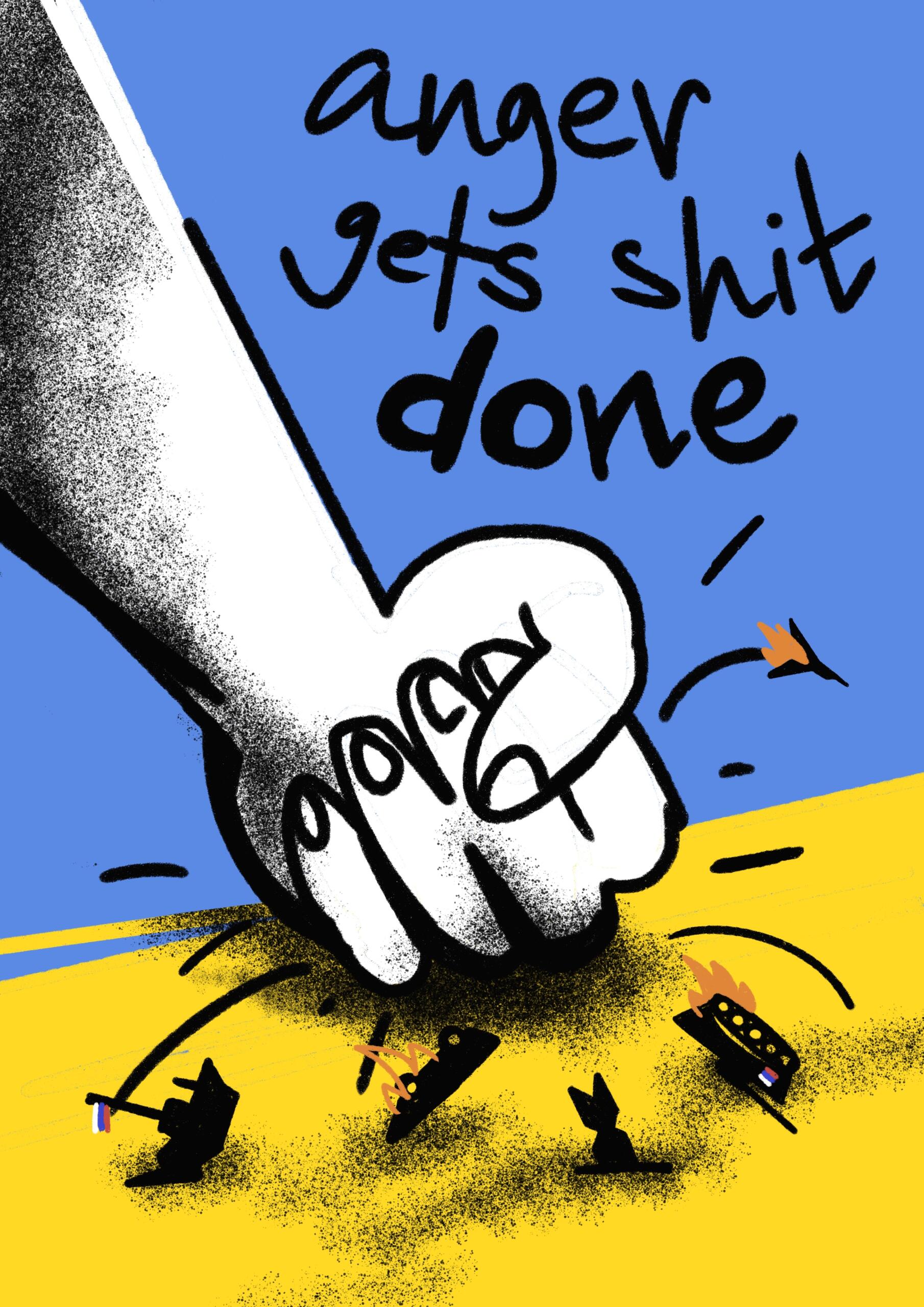
As the February 24th escalation of the war against our homeland rages on, our families remain on the ground in Ukraine. Darya’s mom is in Kyiv and her father is at the frontline defending the country. Iryna’s parents had to flee their hometown and are now temporarily displaced in the west of the country, just like more than 6,5 million other Ukrainians. We are based safely in Scotland and have been closely working with many local initiatives, and have mobilised our energies to find the best ways to help the people of Ukraine. People often ask us how they can help from here or other western countries. Our answer as feminists has been: campaign with us for more military aid for Ukraine.
From the first days of the current escalation, it became clear to us that without better air defence systems we will not stop Russia and Russian war crimes in Ukraine. Some weeks ago we wrote an essay explaining why as feminist we lobby for more military aid for Ukraine, you can read it here. The conversation about weapons is not easy, that is why together with Marjan Pokhylyy we have also been putting together an online discussion series called ‘Ukrainian skies’, in which we talk about the importance of military aid and try to reach out to the broader public. Our first discussion brought together speakers from Ukraine; Pavlo Yurov, Artem Remizov, Tetiana Dolghier, and Anna Khvyl, who shared their testimonies of living under the Russian shelling, as well as Professor Phillips O’Brien (University of St Andrews), who talked us through the kinds of military aid Ukraine needs and reasons why it is essential to provide it now. Our second event featured a discussion with Dr Kristi Raik, Director of the Estonian Foreign Policy Institute at the International Centre for Defence and Security, and Marko Mikelsohn, Chairman of the Foreign Affairs Committee of the Estonian Parliament. While the official position of the Estonian government is in line with NATO’s stance on the no-fly zone, on 14 March 2022, the Estonian Parliament approved the statement demanding a no-fly zone in Ukraine. Estonia is also the 3rd largest provider of military aid to Ukraine (following the US and UK).
Once we, Darya Tsymbalyuk and Iryna Zamuruieva, wanted to work together on an environmental summer school about the steppe in Ukraine. We even came up with the name for it, calling it the ‘Feminist steppe’. But since the end of February, we have put that project on hold to collaborate on another project. With the escalation of war, civilians have been killed, injured, raped, and displaced. And so it is feminist values of standing with the oppressed and the marginalised that have guided us in our response to the violence against our homeland. As we have been advocating for more military aid for Ukraine, many people have asked us why, instead, we do not advocate for peace and negotiations. Feminism has taught us about embodied knowledge, situated knowledge. What does an embodied perception of (in)security mean for a person from Ukraine now, and how would peace look from this perspective? Last weekend together with Olga Loza we translated Nadezhda Sukhorukova’s notes from Mariupol, in one of them she writes: “Three days ago, a friend of my eldest nephew came to see us and told us there’d been a direct hit on the fire station. Some of the firefighters were killed. One woman lost her arm, leg and head. I hope that, even after an aerial bomb explosion, my body remains in one piece.” Once the escalation started, while being thousands of kilometers away from Ukraine, Darya remembers feeling constantly nauseous and sick; Iryna feeling exhausted and tired. These are very different experiences, but they come from bodily responses to Russian aggression. The physical war unfolds far away from us, but the psychological and emotional war takes place in our bodies, too. The embodied knowledge of the war against Ukraine speaks of the profound insecurity that comes with being under attack. The many abstract and theoretical discussions about peace, concessions and negotiations are not only a misread of this colonial Russian war, since supporting the abstract notion of ‘peace’ will not stop Russian aggression, but also dismisses the embodied knowledge of Ukrainians who have been persistently asking for help in defending themselves.
As our understanding of feminism has brought us to organising a campaign for military aid for Ukraine, we have turned to other friends and colleagues from Ukraine, fellow feminists with whom shoulder to shoulder we have been fighting oppression and patriarchy. Their work, their texts, and their political positions have inspired and motivated us in the past and continue to do so now. Below we share their stories in which they tell why they are supporting more weapons for Ukraine.
‘While the world remains far from the ideal, we do not want to be killed’
Tonya & Masha from ReSew sewing cooperative, a horizontal, anti-autoritarian, queer feminist initiative from Kyiv, which makes comfortable and affordable clothing for trans* and nonbinary people, conducts workshops in upcycling and repairing of textile items for LGBTQ+ and feminist communities: “Since the beginning of the war we moved to stay in our workshop and continue to respond to urgent needs of people in the vicinity of our shelter, helping them with food, water and relocation, as well as volunteering by sewing essentials for territorial defence forces and armed forces.
As people who hold antimilitaristic views we wish for a world where there won’t be any weapons, where war would be impossible. Rules are never fully respected, there are always victims among civilians, families and destroyed homes. While the world remains far from the ideal, we do not want to be killed. We want the army that defends us, our homes, our workshop, our friends, our loved ones and their homes, our country, to have enough resources: weapons, bulletproof vests and other body armour to rebalance our capabilities against the aggressor. It is hard to leave our homes, our cities, our country Ukraine. It is scary to stay because every night we hear explosions, sometimes very close to us, every day we are reading about people killed, some of whom we knew. We ask you to close the skies of Ukraine to stop the destruction of Ukrainian cities and the murder of civilians. We need military aviation, we need air defence systems. European countries can help us with these. We want the war to end as soon as possible and in favour of Ukraine, we want our country to return to its sovereign borders so that people who left can come back too. We want to live in a free Ukraine.”
‘None of the gender or feminist theories give you the understanding of the context as much as your own life’
Kateryna Iakovlenko, curator, researcher, and art critic, born in the Luhansk region and based in Kyiv: “Since 2011 I have been co-organising various feminist events and do research analysing women’s lived experiences of violence and war, representation of violence and war in art etc. I often talk about non-violence, possibility of inclusion, about the necessity and power of empathy, about the need to support those who are in the minority. One of the arguments of those who do not want to supply Ukraine with weapons is the development of nationalism and militarization. Yes, we have a lot of people who are going to fight, including women and members of the queer community. This measure is extreme as we need to fight for our own lives. None of the gender or feminist theories give you the understanding of the context as much as your own life that contains fear and courage simultaneously. The condition for non-violence would be the international court, where Russia and Russian people that support the war will face trial and pay reparations to everyone who suffered from this war.
However, today Ukrainian society ended up in the oppressed minority, having signed the Budapest Memorandum [on Security Assurances]. The Memorandum guaranteed us peace in exchange for our [nuclear] disarmament. Therefore when Russia attacked Ukraine, annexing Crimea, organising illegitimate referendums in parts of the Luhansk and Donetsk regions in 2014, we had neither military nor economic resources to resist. Our current military and economic capabilities are also significantly lower than Russian ones. In particular we are lacking air defence systems and other defence resources to resist Russia in the sky. They are cowardly shelling our cities from the skies knowing that none of the towns will willingly surrender. As we’ve seen even in the currently occupied cities, people go out on the streets with protests to manifest their power. Not military, but civic power.
Ukrainians today demonstrate unbelievable courage in the fight for their own rights and freedom, as it’s incredibly difficult to fight under the exploding missiles.
European and international partners should also demonstrate courage. This courage means covering events from the perspective of the people living in Ukraine: women from the shelled maternity hospital, a journalist killed in Irpin, or those who are protesting in Kherson and Okhtyrka. Do not call these events a Ukrainian crisis or a war in Ukraine. It’s Russia’s war in Ukraine.
This courage also means supporting Ukraine not only by providing humanitarian aid, but also by providing armament and defence systems. We are not asking you to fight with us (though we are grateful to the volunteers who join our fight). First and foremost we are asking for defence systems that will let us save our cities and our culture.
Finally, this courage means revoking Russia’s voting rights in international organisations. A country that erases the rights of others to speak shouldn’t have its own.”
‘Staying away from the issue of arming people who have no choice but to defend themselves is not about feminist values’
Anna Khvyl, feminist sound artist and curator from Kyiv: “On the International Day of Women’s Rights and World Peace, the Russian troops opened fire on a bus with women who were going to their work in an orphanage near the city of Mykolayiv. The bus had a red cross painted on it. After the shelling, the bus caught fire. Three women were reported dead.
Ahead of the 8th of March, I helped raise money for bulletproof vests for my friends who joined territorial defense groups in my city; they are artists, intellectuals, ecoactivists. Some of my foreign friends have said that it is not easy to support the militaries in their communities, they would rather support refugees (And it was still about the bullet proof vests, not ammunition).
I understand very well the state of helplessness and moral choice in which many people in the EU now find themselves. I was there in 2014, when the war began in eastern Ukraine, but my city remained safe. I also received refugees at home and sent medicines.
When the house in front of my school near the place where my parents slept was bombed a week ago, my picture of the world turned upside down. This cannot be explained in words. I do not have much hope for my ability to convince you now.
Many of my friends have chosen to stay in the cities that are being shelled to resist or to help those who cannot leave – the military, essential workers, people with disabilities, sick people who will not survive the evacuation. They will not be able to cross the border and get help as refugees. Most of the Ukrainian population won’t be able to cross the border.
Staying away from the issue of arming people who have no choice but to defend themselves is not about feminist values. It is a privilege to maintain neutrality by living in a safe place and knowing that your country is well protected by NATO. Not sharing the weapons that your countries have is not about achieving peace, it is about supporting the aggressor and increasing the number of civilian casualties in Ukraine.
Believe me, I know what nonviolent resistance is, and there is not a single chance for it now in Ukraine. I know the consequences of militarisation. My Ukrainian feminist colleagues have organised several programmes to support victims of domestic violence which increases as a result of militarisation.
But now the priority for all of us is to stay alive, and to give this chance to as many people as possible. And the only way at the moment is to support the armament of the Ukrainian army.
Ukraine needs heavy weapons, which the Western partners are still not ready to actively supply. And I’m not even talking about troops. Please demand from your governments to give Ukraine at least fighter jets, anti-missile and anti-aircraft defence so we can defend ourselves and continue our feminist work!”
‘Who is the embodiment of these capitalist and patriarchal structures in a very particular point in time and place?’
Iryna Kostyshyna, feminist graphic designer and visual artist from Kyiv: “What do I think about the war and armaments, as a feminist?
Well of course I would like to live in a world where there are no wars, no arms races and no violence towards marginalised groups. Unfortunately, as we see, this is not the case now.
I am looking at the responses from international feminist, leftist and progressive circles, and I am honestly baffled by some of them. While being absolutely right about the need to respond to the humanitarian crisis caused by the war, these people seem to miss the point that this war has a perpetrator, a country which invaded a much smaller neighbour, following the lead of a dehumanising rhetoric. For some strange reason I hear vague messages about how “war is bad” and how it could eventually militarise and radicalise Ukrainian society. I sometimes feel like Ukraine is the side who is made to counter the accusations – of sexism, of militarisation, of not letting men leave the country, of putting international students in danger, of creating a flow of refugees – as if the war just happened by itself like some Naturgewält (natural disaster). I see calls against ‘dehumanising Russians’ while it is Ukrainians who are most effectively dehumanised now.
I have also heard an argument that ‘the war is just a tool of capitalism/patriarchy so feminists/womxn should stay away’ and again I feel it is a very vague message. Who is the embodiment of these capitalist and patriarchal structures in a very particular point of time and place?
Another argument that I have a hard time dealing with is ‘we want to help Ukraine but we do not want to support weapons/military’. And again I feel as if these persons are speaking from a very speculative position. I may understand why this point might have evolved in Europe or the US, where wars for the last 70 years were military imperialistic interventions, directed outwards. But the people in Ukraine, Georgia, Moldova, Balkan countries, Baltic states, or Syria have other lived experiences. You need to be prepared to hold your ground in a military manner when somebody is threatening to take your home and life away. And there is, in the countries outside the First World, an embodied feeling of Home, of Belonging, pretty much unlike the uniform experience of digital nomadism or global citizenship. Weapons are tools to not let somebody ruin this Home. And soldiers are somebody’s parents/children/siblings/partners. It is really that simple. Helping defenders of the country stay alive and defend the country effectively means less refugees, less orphaned children and raped women, less civilian casualties, poverty and famine. So we are calling our fellow feminists to address their government representatives in respective countries: Ukraine now needs weapons, anti-aircraft and anti-tank missiles to help counter the invasion and save lives.”
How can you campaign with us?
As we have said already, talking about military aid is not easy, but it is very important. We ask you to talk to your friends, to your colleagues, and to your relatives, tell them why without military aid we will not be able to stop Russian aggression. Please share this text and our other texts and the discussions we have mentioned above. If you are organising a demonstration or an event for Ukraine, please remember to raise the question about military aid – do not be silent about it.
Individually, you can also write to your government representatives and suggest some simple and concrete steps for them, below we are listing some ideas:
- supply Ukraine with anti-air equipment, especially ones that would allow the targeting of high-altitude jets (or aircraft) during night time and in poor visibility
- supply Ukraine with UAVs (drones) to aid in their fight on the ground
- provide MiG and Sukhoi (SU) fighters which could be supplied to the Ukrainian Air Forces as these are the same planes that Ukrainian forces currently fly
- provide logistical support to Ukraine to transport weapons to the country and across the country
- declare that, in the event of Russia using biological and chemical weapons, a no-fly zone will be established
- provide vital military and humanitarian supplies to Ukraine that will sustain the Ukrainian Armed Forces’ capabilities and alleviate civilian suffering; bulletproof vests (ballistic level 4 at minimum) and helmets are a priority
- make sure sanctions are implemented thoroughly
Finally, please consider donating to ReSew, as well as to the Ukrainian military and initiatives that support it, such as Come Back Alive, the Serhiy Prytula foundation or our friend Oleksii Rudenko. While we are campaigning for more military aid, many defenders are still missing bullet proof vests and other body armour, and Darya’s father is not an exception in this case, he still has no boots, no uniform, no helmet. Donating to the initiatives listed above will help to defend people who are defending our freedom right now.
Edited by Ewa Borysiewicz and Katie Zazenski
Imprint
| Index | Anna Khvyl Darya Tsymbalyuk Iryna Kostyshyna Iryna Zamuruieva Kateryna Iakovlenko ReSew ReSew sewing cooperative |

